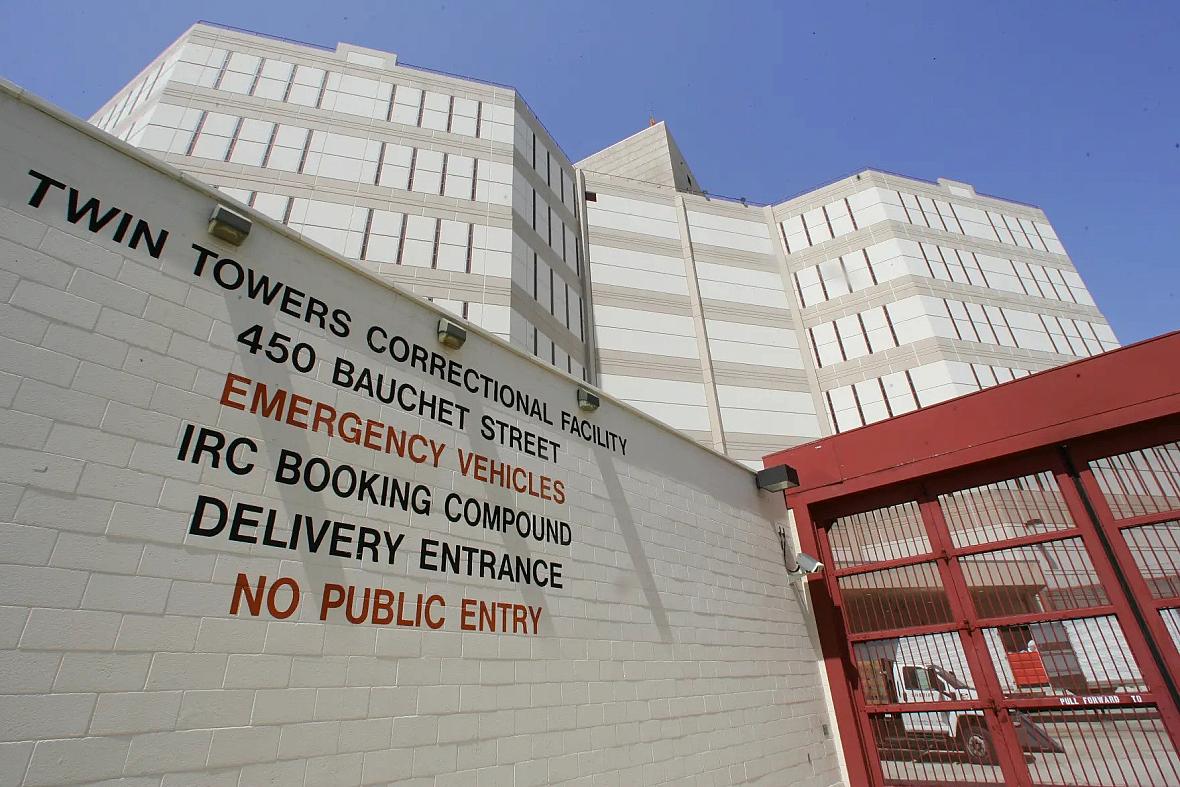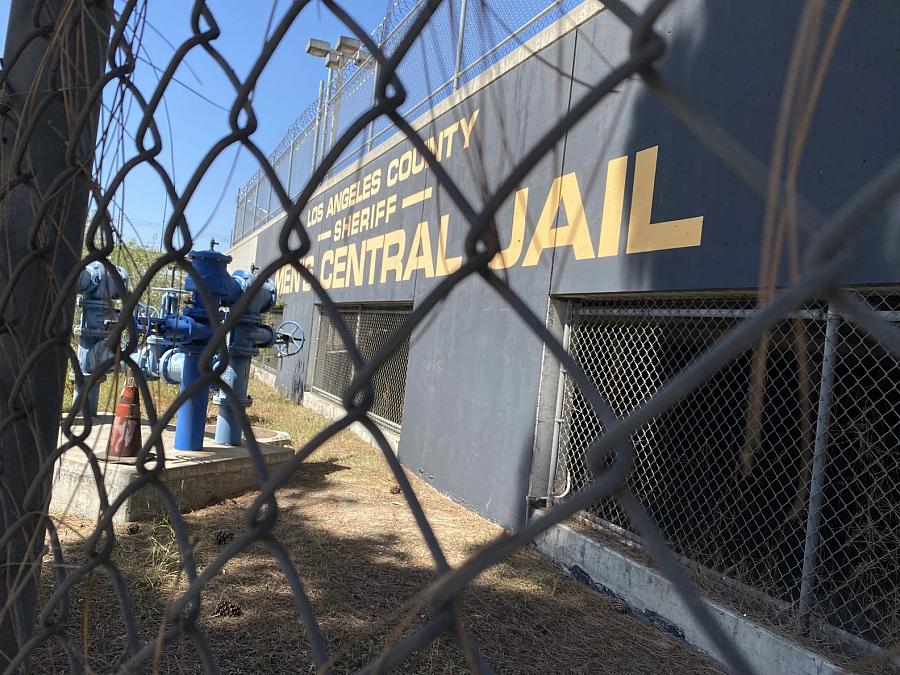LA County Wants 1,000 More Treatment Beds To Help Divert People Experiencing Mental Illness Out Of Jails
The story was originally published in LAist with the support from our 2022 Data Fellowship.

The Twin Towers Correctional Facility in Los Angeles.
Robyn Beck / AFP via Getty Images
The L.A. County Board of Supervisors wants to add 1,000 treatment beds to help divert people living with mental illness out of jail.
The supervisors agreed Tuesday to direct the Office of Diversion and Reentry (ODR) to come up with a “ramp-up plan” in three months that would include a timeline, staffing needs and more. The motion by Supervisor Holly Mitchell also directs the county CEO to come up with funding sources for the additional 1,000 beds so that they would be in service by 2025.
“As the County continues to embrace a ‘Care First’ vision, it is essential that we properly address the mental health needs of those in our jails rather than expose them to turbulent and violent environments that exacerbate their conditions,” the motion reads.
By many measures, the Office of Diversion and Reentry has seen success in getting people living with serious mental illness or substance use issues out of the jail system and into care.
Some success, but needs remain high
According to the motion, as of February 2023, roughly 9,500 people have been released from jail and into the supervision and care of ODR since the office was created in 2015. A 2019 RAND study found that 74% of survey respondents enrolled in the program had stable housing after 12 months and 86% had no new felony convictions.
While ODR has seen success in the seven years it’s been around, there is still a dire need to divert people living with mental illness out of the county’s jail system.

The Jail complex in downtown Los Angeles.
Robert Garrova / LAist
A report late last year from the L.A. County Sheriff’s Department noted that people with mental health needs then stood at about 40% of the overall jail population. During the fourth quarter of 2021, the jail population of people experiencing mental health issues stood at 5,715 and comprised 43% of the total average inmate population of 13,319.
“In the jails we have health leadership that has literally said, ‘look the crisis is so big we don’t have clinical capacity to meet people’s needs,” said Mark-Anthony Clayton-Johnson, who chairs the Sybil Brand Commission.
Clayton-Johnson said programs like ODR housing include services on-site and provide settings that are “certainly more dignified than being crammed in a cell at Twin Towers or being crammed in a dorm at Men’s Central Jail."
LAist’s review of coroners' records found 2021 marked the highest number of deaths by suicide inside the downtown jail complex in eight years. The rise in suicide deaths comes at a time when the L.A. County Jail system is plagued by a number of issues: Facilities are overcrowded, jail officials are struggling to maintain a mental health workforce, and the jails are out of compliance with requirements mandated by federal court.
ACLU calls conditions 'abysmal'
In June, county attorneys are slated to go before a federal judge for a contempt hearing.
The ACLU wants the court to hold L.A. County in contempt for allegedly failing to improve what the ACLU called “abysmal” conditions at the Inmate Reception Center (IRC).
The ACLU alleged in an emergency motion filed last fall that its attorneys, who recently visited the facility, saw “abhorrent” conditions at the IRC, including: “[p]eople with serious mental illness chained to chairs for days at a time, where they sleep sitting up ... People defecating in trash cans and urinating on the floor or in empty food containers in shared spaces,” and several other disturbing observations.
In a letter sent to the L.A. County Board of Supervisors Monday, Peter Eliasberg, chief counsel at the ACLU of Southern California chief counsel, and Melissa Camacho, a senior staff attorney at the organization, praised Tuesday’s motion as an “important step toward improving public safety.”
But in the same letter, the ACLU attorneys warned that, by their reading, the effort will not be enough to protect the county from being held in contempt of court since it does not bring the diversion beds online fast enough.
“...Unless the Board moves quickly to do far more than this motion does, the County will continue to violate the law and the rights of people in the jails,” the letter reads.
“We agree that conditions in the jail system must improve, particularly in addressing the complex needs of individuals with mental health issues," the L.A. County Sheriff's Department said in a statement emailed to LAist last month. "We are committed to working diligently to become compliant with all court orders and meet the expectations of the court and the community we serve."
Crucial step toward closing a controversial jail
Jail reform advocates see additional ODR beds as a crucial step towards another one of the county’s goals: closing the decrepit Men’s Central Jail (MCJ).
It’s been more than two years since the L.A. County Board of Supervisors received a 145-page proposal to close the aging facility.
Prepared by a work group led by the County Office of Diversion and Reentry and the Sheriff’s Department, in partnership with community groups and service providers, the report offered a three-pronged strategy for shutting down the 60-year-old, "unsafe, crowded and crumbling" jail:
- Redistribute the MCJ population to other jails;
- Invest “significantly” in beds and services within the community;
- Divert some 4,500 people with mental health issues out of jail (roughly the number of people being held at MCJ).
The proposal said it would require a large investment in expanded community mental health and substance use services before L.A. County will be able to close the jail. The report authors also estimated that it would take up to two years to get it done.
Clayton-Johnson, who also serves as executive director of the advocacy group Dignity and Power Now, told LAist the additional ODR beds are needed to get people out of the jail system.
“It’s certainly not enough beds, but it is an important and significant step, and community members were calling for it,” he said.

